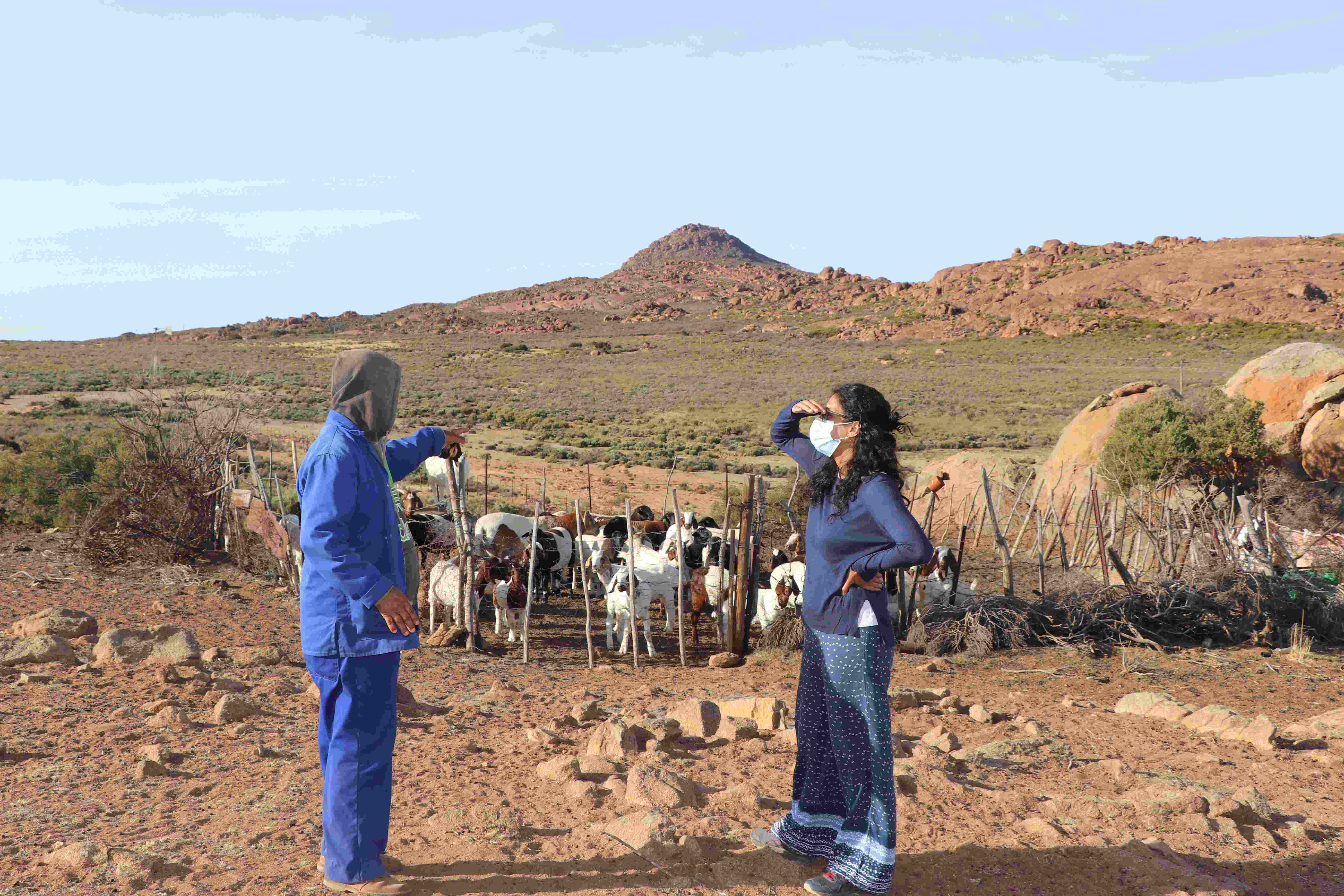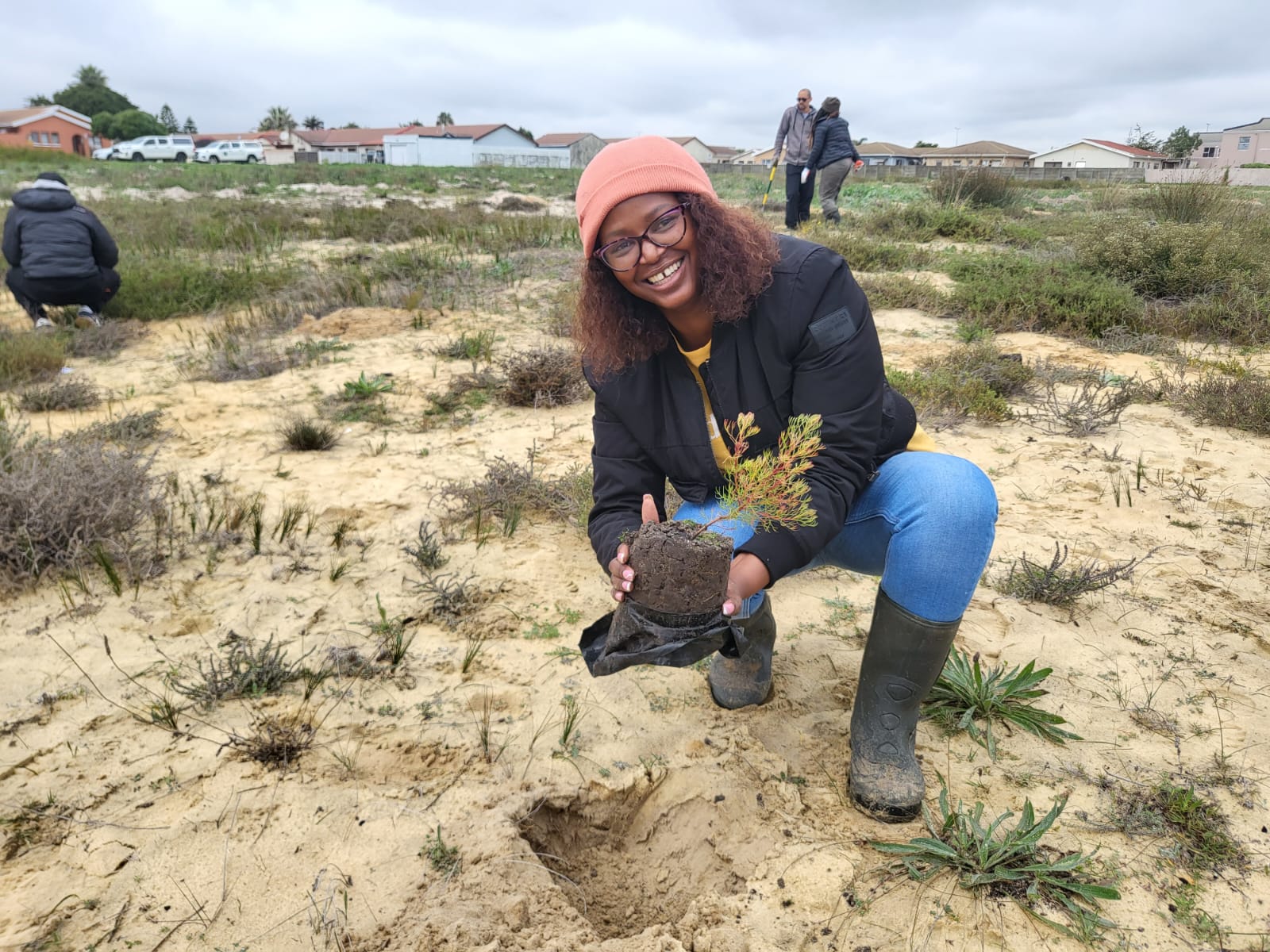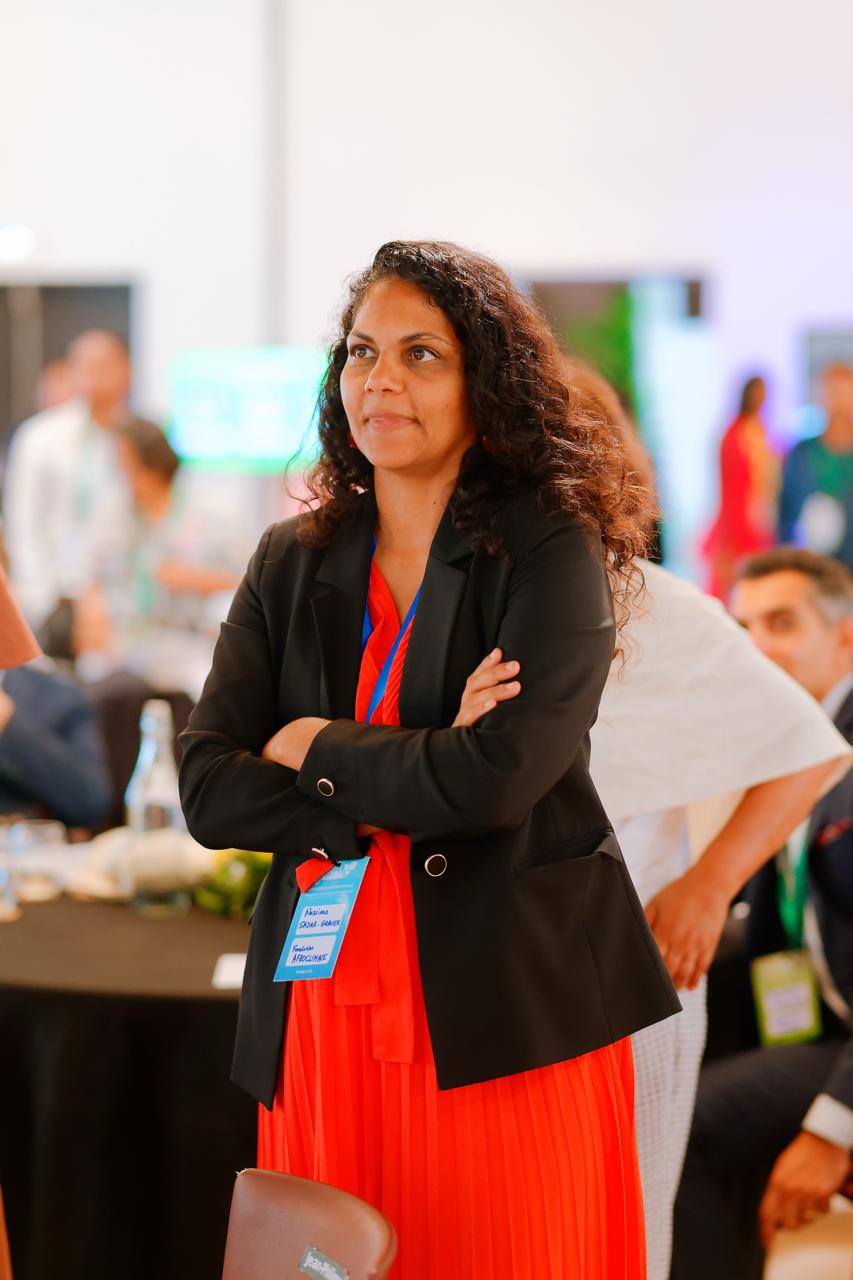If enough of us fully comprehend that the work requires a systems-level shift and if enough of us are willing to make the necessary sacrifices, then we will see positive change and liberation for all.
In Denisha Anand’s world, peace isn’t just the absence of conflict; it embodies justice, equity, and access to safe spaces. Her commitment to environmental conservation and restoration is, thus, focused on reviving neglected biodiversity areas, especially those impacted by racial disparities.
As a biodiversity project manager overseeing a 109-hectare wetland system and heritage site, she drives initiatives to rejuvenate overlooked public open spaces in Cape Town, breathing new life into neglected areas.
As the Founder and Director of Leaf Culture, she leads and collaborates on a range of community-centred projects. Her initiatives aim to empower economically, establish safe, natural spaces, and safeguard bio-cultural heritage.
Additionally, Denisha serves as an educator, offering insights on alternative environmental practices that reshape perceptions of environmental conservation.
The WE Africa 2023 fellow shares her story with Damaris Agweyu.

Denisha, what's the key thing you want people to understand about you after they've read your story?
That at my core, beyond the struggles and the labels, I am someone who deeply cares for nature. When I step into problematic spaces, that care may shift into assertive discussions on access, race, gender, and calling out norms that just don't cut it. This may tempt people to stereotype me in a certain way. Yes, I've faced challenges, and yes, my past carries layers of trauma, but it doesn't confine or define me; it fuels my passion for driving change.
When you strip away all the layers, the heart of my story comes from one place—the love I have always had for our planet and its people.
Where does the need to fight injustices come from?
I grew up in a troubled home, and I'm committed to ensuring that my daughter and every child out there never experience what I went through.
I witnessed my father's battle with substance abuse and took on the role of a protective older sister, sacrificing my childhood and trying to hold things together while my mother endured a lot of pain and suffering. Now, my dad has turned his life around, and he is a great human being and the best grandfather to my daughter, but he was deeply affected by what the apartheid era did to him. Both my parents were. And that traumatised us as a family. So, as much as this is my story, it's also my father's, mother's and sister's story.
Being a woman of colour has also definitely shaped how I show up. I've had to work extra hard to get here. Nobody knew what I was going through at home. Still, I was expected to carry on and deliver the same academic results as those in more privileged positions.
While these circumstances shaped my radical approach in the environmental space, I don't ever want to be respected simply because I have endured trauma and violence. I want to be respected for being a trailblazer and for my professional offering. But there is also value in knowing someone's story, knowing a bit more about their human experience rather than just the product they're selling. And I realise that many of us have similar stories. This is why I'm very outspoken about trauma and violence, it’s part of a post-apartheid reality. And I believe sharing our stories heals us and brings us together.
Did you choose this path, or did it choose you?
I feel like it chose me because that initial passion for the environment was just something I was born with.
One of the options I wanted to pursue in terms of my career was social work. And that was when my dad said, "Denisha, I'll never tell you what to do with your life, but social work is not for you. You're not going to cope because of the type of person you are and the things you'll see." Until then, I had no idea my father had ever seen me. Now that I understand myself, I know he was right. I would have broken a very long time ago if I was a social worker in South Africa.
Given the situation at home, my high school experience was tough. I wasn't even sure I'd perform well enough to get a bachelor's pass. So when I did and got accepted into a biodiversity and conservation biology course, I was literally in tears.
Initially, I was stuck on the science path. But things changed when I realised the people aspect was missing. While doing research work for my master's, I was going into communities, taking plants and testing them; and there wasn't much consent. This didn’t sit well with me. I wanted to work with the communities in these natural systems, not just study plants in labs. So, I moved on and started documenting human rights violations on farms.
That experience opened my eyes to the harsh realities in the environmental space: racism, unequal treatment of labourers, and discrimination against women. You know, women are not given permanent jobs because then farm owners have to provide them with maternity leave. Instead, they’re placed on seasonal contracts. This made me angry. I fully understood that this was a systemic problem, and things shifted for me regarding how I wanted to show up as an environmentalist.
If we are engaging in racist environmental practices that directly impact people, that's not OK. That's where the injustice is. I wanted to understand the depth of people's experiences at the hands of these racist practices. What does that look like? What does it feel like? If you understand how these mechanisms work, you can surely craft a more sensitive and informed approach that integrates the voices of indigenous communities, the displaced, and people of colour. So, I returned to university and proposed a new master's degree, shifting from purely science-based work to the social sciences.

No doubt there has been some backlash towards your approach.
Some leading environmental education organisations in South Africa don't want to work with me because I'm too outspoken about things that make them complicit in this whole problem. I used to think that assimilation was the way to go, that maybe toning down our voices could get us further. But there are enough people making money out of being conservative.
I've learned that if we open ourselves up to the fact that there are people with amazing intentions who are willing to invest in our work, and if we don't hold on to this idea that colonial money is the only way to keep going, it will give more people the courage to take that step in the right direction.
The more I’ve put my work and intention out there, the more work I've been getting. So yes, there's been a lot of pushback, but those are not people that I want to work with, to begin with. And I'm noticing more funders who are willing to invest in social justice and biodiversity projects because they're realising that investing in environmental practices that do not include people is damaging to the planet; it's self-destructive. So there's a logical shift.
I think that if enough of us fully comprehend that the work requires a systems-level shift and if enough of us are willing to make the necessary sacrifices, then we will see positive change and liberation for all.
What do you value most?
I value my family dearly. And as I get older, I value peace and calm, which is why I advocate for safe, calm spaces. Spaces where you can be with yourself in a world that's getting busier and faster. And I'm putting that above making exorbitant amounts of money.
It's also essential in the post-apartheid context. One of the things that they took away from people of colour during apartheid was their access to safe, clean, natural spaces in an attempt to dehumanise them.
I genuinely believe that if people have access to green spaces, it can transform their psyche. If women in abusive homes can get out of the noise and away from the violence and come to Princess Vlei, which is where I work, and spend the day there, they can get the mental clarity they need. And when I see what my daughter enjoys and her connection to nature, I can't help but think that every child deserves to have these experiences.
That's the core of my fight. To restore humanity in people by making sure that they have access to these spaces. So, my need for peace, quiet, and calm is related to access to nature. And this is all part of the social justice work.
So, you fight for the sake of peace.
That's exactly it, for peace that brings liberation. And it's a very necessary fight because these things have been withheld from us, forcefully and violently. And so there's a misconception about these movements being destructive.
I get frustrated with the labels people attach to this fight. They might call it destructive or angry, but it's not about tearing things down; it's about dismantling harmful systems and rebuilding. We're not out to destroy; we're here to restore and build a more equitable and just world.
It's about planting life in places that have been neglected, giving voice to those silenced by colonial and patriarchal structures. That's what our fight truly looks like—bringing restoration and speaking up where voices have been drowned out.
***
This interview is part of a series profiling the stories of the 2023 WE Africa leadership programme fellows, African women in the environmental conservation sector who are showing up with a strong back, soft front, and wild heart.




